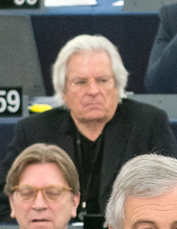Javier Nart facts for kids
Quick facts for kids
Javier Nart
|
|
|---|---|
 |
|
| Born | 19 August 1947 |
| Alma mater | |
| Occupation | Politician, writer, lawyer, war correspondent (1977–1984) |
| Political party | Citizens |
| Position held | Member of the European Parliament (2014–2019), Member of the European Parliament (2019–2024) |
Javier Nart Peñalver, born on August 19, 1947, is a Spanish journalist and politician. He has been a member of the European Parliament since 2014. He is currently part of the Renew Europe political group. From 2012 to 2019, he was a member of the Citizens (Cs) party.
Contents
Early Life and Education
Javier Nart was born in Laredo, a town in Cantabria, Spain, on August 19, 1947. His father was a notary in Bilbao.
Javier studied law at the University of Barcelona. He also studied journalism because he wanted to move to Barcelona on his own. He sometimes joked that he was a "bad lawyer" during the week but an activist on weekends.
Career as a Writer and Journalist
Reporting from War Zones
Early in his career, Javier Nart worked as a war correspondent. This means he reported from places where wars were happening. He covered conflicts in many countries, including Lebanon, Chad, Myanmar, and Yemen. He met and interviewed people involved in major world conflicts between 1977 and 1992.
He also reported on the Nicaraguan Revolution. This revolution led to the removal of dictator Anastasio Somoza in 1979. Javier Nart explained that he traveled from one war to another. He took photographs that helped people around the world understand these conflicts better. He became very close with the Palestinians and the Fatah resistance group. He believes they deserve a better life.
Photography and Books
Some of Javier Nart's photographs were published in big newspapers like Newsweek. He once took a photo of a dead boy with his mother holding money. He later regretted publishing this particular picture. He often talks about how terrible war is. He believes that showing real images of war can make people stop supporting it. He is also concerned about drones, which make serious war injuries seem less real.
Javier Nart's first book, Viaje al otro Brasil, was published in 2002. This book was different from his other work because it was not about war. Instead, it was a travel guide to parts of Brazil that many tourists do not visit.
In 2003, he released ¡Sálvese quien pueda! Mis historias e historias de guerra. He wrote this book so his children would know about his experiences in wars. The wars he reported on showed how cruel humans can be, but also how brave they can be. The things he saw were so awful that he sometimes could not talk to his family for days after returning home.
He published three more books in 2007. One was Guerrilleros, a history book about the Spanish people fighting against Napoleon. He also released two travel books: Viaje al Mekong and Viaje al desierto.
His most recent book, Nunca la nada fue tanto, came out in 2016. In this book, he explains why he took part in so many conflicts. He said it was his duty to help reduce injustice, pain, and suffering. He believes that life without freedom and justice, or without trying to achieve them, is not meaningful. His strong belief in justice is a very important part of his life.
Political Career
Becoming a Member of the European Parliament
On February 22, 2014, Javier Nart was chosen to lead the Citizens party for the European elections that year. He was then elected to the European Parliament. The European Parliament is where elected representatives from different European Union countries work together.
In the Parliament, he served as a vice-chair for a group called the Alliance of Liberals and Democrats for Europe. He also worked on the Committee on Foreign Affairs. This committee deals with how the European Union interacts with other countries. He was also part of groups that worked with countries in Africa, the Caribbean, and the Pacific, and with Latin American countries.
Javier Nart was re-elected to the European Parliament in the 2019 European election. He was fifth on his party's list. On June 24, 2019, he stepped down from his role on the Citizens party's national committee. This happened after the party decided not to negotiate with another political party, the PSOE.
In September 2019, Javier Nart left the Citizens party. However, he continued to serve as a Member of the European Parliament. He explained that he left the party because he strongly disagreed with its alliances with other political parties.
In 2020, Javier Nart led the European Union's team that watched over the 2020 Ghanaian general election. This team made sure the election was fair.
Views and Beliefs
Javier Nart strongly supports a united Europe. He believes the European Union is very important. Like other politicians from his party, he likes the idea of moving towards a "United States of Europe." This means European countries would work even more closely together. He also thinks that European countries should work together on foreign policy and defense, often with NATO.
Javier Nart believes that the European project is too important to let people who are against European unity stop it. He feels that the European Union helps ensure peace, democracy, and social well-being for its member countries.
In early 2021, Javier Nart and 15 other Members of the European Parliament wrote a letter. They asked the European Union's foreign policy chief, Josep Borrell, to replace the EU ambassador to Cuba. They believed the ambassador was siding too much with Cuba's government.
See also
 In Spanish: Javier Nart para niños
In Spanish: Javier Nart para niños
 | Bayard Rustin |
 | Jeannette Carter |
 | Jeremiah A. Brown |

